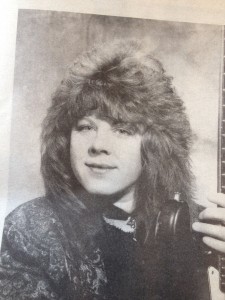BY MATT HICKEY
She’s been compared to Jimi Hendrix many times and her talent is earning widespread recognition. But sweet success for this gal who sings the blues meant first overcoming some pretty big problems.
What would you do if you had dyslexia, a bout with a drinking problem, and discovered you had attention deficit disorder? Give up? Feel sorry for yourself? Get the blues?
If you’re guitarist Kelly Richey, you play the blues and get over it.
Of course, the Lexington native didn’t choose to play the blues simply because she’s had some obstacles to overcome in her life. But the type of music she performs certainly helps her mental outlook.
“Blues, there’s just something about it that no matter how bad you feel, and you hear the blues, and you talk about how much worse it can get, you feel better,” Richey says during a chat at a Lexington coffee shop. “It’s like a really good dose of medicine.”
Richey has played with such luminaries as James Brown, blues legend Albert King, and singer-songwriter Warren Zevon. She now fronts the Kelly Richey band and six months ago, self-released a CD, Sister’s Got a Problem. Out of an original 1,000 copies, Richey says she’s got about 20 left.
The band, which also includes drummer Shawn Wells and bassist Terry Williamson, is working on a second disc in the hopes of getting it out this time on a label.
‘Involved in the process’ for Richey is attempting to become more of a songwriter, something that has until recently taken a backseat to her guitar playing, which is understandable considering she’s been compared to Stevie Ray Vaughn, her idol, and Jimi Hendrix.
 “One of my dreams is to be a songwriter,” Richey says. “I would be a lot more disappointed if I never could write or develop as a writer than if I didn’t succeed as a guitarist because I feel competent as a guitar player. I’m a very strong co-writer. I’m dyslexic. Words don’t come easy for me. I don’t have anything to draw from except life experience, so I think I’m a slow developer in that area.
“One of my dreams is to be a songwriter,” Richey says. “I would be a lot more disappointed if I never could write or develop as a writer than if I didn’t succeed as a guitarist because I feel competent as a guitar player. I’m a very strong co-writer. I’m dyslexic. Words don’t come easy for me. I don’t have anything to draw from except life experience, so I think I’m a slow developer in that area.
“I’ve been seeing evidence this last year — especially when I realized I don’t have to complete songs — that I can write with other people just to get the ideas out. When you get all uptight about ‘Oh god, I’ve got to finish this and it has to be good,’ then all of a sudden you shut down. Working with others, I don’t have to worry about finishing anything. [The songs] are in hands that can do that with me or for me.”
As far as the Vaughn/Hendrix comparisons, the soft-spoken Richey only says, “I think it’s crazy. I’m flattered by it, absolutely. I wish it was true, I guess that’s what I think. They’re my heroes, you know? They’re the standard I hope to rise to someday.”
Richey, 32, started playing the guitar at 15, after previously learning piano and drums. Although she still plays other instruments, she fell in love with the guitar right away and has taught guitar for 12 years.
“I had a really great guitar teacher [Eddie Beckley],” Richey says. “I don’t think I’d be a guitar player without him, I really don’t. He just died [in November]. He basically kept me mad enough to practice 16, 17 hours a day. He was like, ‘if you don’t have this down, don’t come back.'”
An early introduction to black culture, along with her healthy interest in rock and roll, initially led Richey to an education and appreciation of the blues she would eventually perform.
“When I was a kid growing up in Lexington, my uncle was a preacher here in town, and we had the first church to integrate,” Richey says. “We were real involved in the black community, and there was a man named Dr. J. Robert Bradley that used to come hold revivals at our church…He was like the male version of Mahalia Jackson. For 9, 10 years of my life, he’d come hold revivals a couple times a year, and growing up in a white church, having this rich, one weekend a year of like, ‘Wow, what is that? We don’t have that,’ it was something else. That always stuck with me.”
“I grew up playing rock. All of my rock influences are blues-based artists — Zeppelin, Hendrix, Clapton, Stevie Ray, Aerosmith — so I thought that they wrote the book. I’m at that age where I’m just now getting old enough to say, ‘Wow, I didn’t realize they learned it from someone else.’ So I started diving into all their influences, and I just found this huge wealth of stuff that I just didn’t know.”
So it logically follows that while others may label Richey’s music as simply the blues, she prefers the term “blues-rock.”
“I think [my music] is rock,” Richey says. “I’d like it to be blues-rock. I’ve endeavored to head down this road called the blues, and I’ve only gotten a few miles. I think anybody can have the blues and I think anybody can play the blues.”
It has been an eventful past few years for Richey. Mixed with the high points of discovering her love for the blues, starting a band and releasing her first record were her dyslexia, her alcohol problem, and discovering she had attention deficit disorder, all of which she tackled with the same determination she did when learning the guitar.
“Instead of doing the AA route, I decided to go to a real good therapist and deal with me,” Richey says. “I’m going to be in bars for the rest of my life. I can’t run from it. I don’t have to stand on a soapbox and preach to anybody about it. There’s a lot of things that I’ve had to tackle and I’ve had to come to terms with — for me.”
“I started taking Ritalin [for attention deficit disorder] about a year ago, and that stopped most of my problems,” she says. That was a major problem for me for years, stress and frustration — I’d shut down. There was a need to self-medicate. If that wasn’t the case, I might not have the luxury of having a beer every now and then — there really was a problem there.”
Throw in industry sexism, which Richey, being a female guitar wizard, says she faces every day — “I do get tired of people saying, ‘Wow, that’s great for a girl.’ In the last few years, I’ve heard people correct themselves. Usually the girlfriend will nudge them in the ribs really hard,” — and Richey has had to deal with quite a few things. Far from patting herself on the back for her successes, she gives the credit to others.
“I have wonderful parents,” Richey says. “I was raised right. I have wonderful friends that have stuck by me, and have drawn lines — that tough love syndrome, I guess, but it’s really true. I needed that. I’m a firm believer in God. Everything that I’ve ever needed has been there. I might have missed it, but it was there. And it always came back around and eventually I got it. I’m not thankful for the difficulties I’ve had — I’m just thankful for the opportunities I’ve had to overcome them.
“Success to me is when you do the best that you can, and I feel very successful because I’ve always done the best that I could, even though I’ve screwed up a lot,” she concludes.
“To me, being really successful in this business is getting to the point where you can play with those people that you’ve idolized. That’s why you stay in it, to hope that you get there. It’s not the money or the press or anything like that. I don’t care about that. I could’ve sold out on many occasions and gone farther than I’ve gone, but they wouldn’t have been the directions I wanted to go in. I’ve never really gauged success like that. It’s always been if I was happy, and being true to what I did.”








